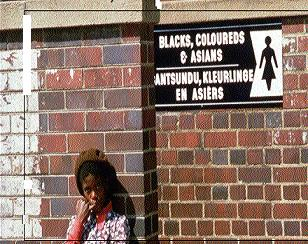
A stalwart of the anti-apartheid sport boycott movement, Isiah Stein, has passed away in the UK. After serving time in prison in the mid-1960s [perhaps not with Nelson Mandela, as noted by Omar Badsha’s comment to my earlier post], Stein left South Africa for Britain where he worked tirelessly for the exiled South African Non-Racial Olympic Committee (SANROC).
Three of his sons became professional footballers in England; Brian had an illustrious career at Luton Town and earned an England cap in 1984. Playing for Chelsea, Mark once scored in seven consecutive matches (a record which stood until 2002); Edwin meanwhile played for Barnet.
It is little-known stories like those of the Stein family from Cape Town that remind us of the dignity, humility, hard work, and sacrifice of individuals who fought relentlessly to advance the cause of sport and human rights in South Africa and beyond. Rest in Peace Isiah.
Click here for article on Stein’s passing by Kick it Out.
P.S. I will soon post a review of the “Offside” exhibition at the District Six Museum in Cape Town, which prominently features the Stein family and football’s role in fighting racism.
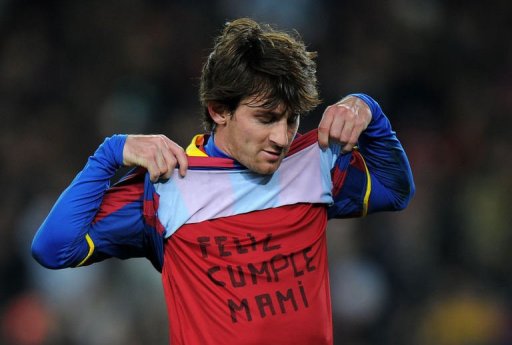
The Spanish Football Federation fined Lionel Messi between 2000 and 3000 euros for revealing a t-shirt during a goal celebration that wished his mother a happy birthday. The referee did not issue the world player of the year a yellow card, but noted this “crime” in his match report.
In today’s Disneyball, communicating anything other than an officially sanctioned marketing message or corporate sales pitch is not tolerated. Shame on Spain — reigning world champions — for punishing freedom of speech and insulting our core humanity.
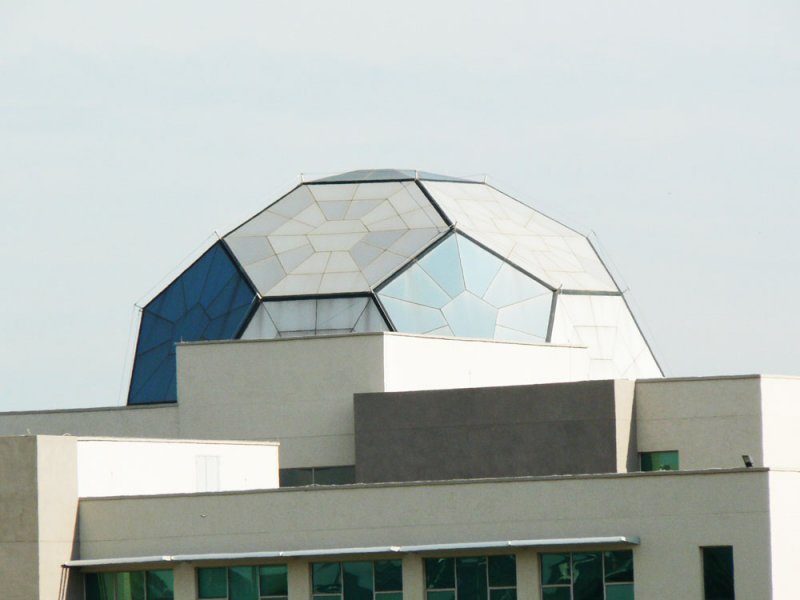
Mzansi Football and Kickoff.com report that the captains and coaches of South Africa’s men’s and women’s national teams failed to cast their vote for FIFA’s Golden Ball as the World’s Player of the Year awards are now known. According to the governing body, the 2010 World Cup hosts were one of just a handful of countries (out of 208) that did not vote. The awards went to Lionel Messi for the second year in a row and Marta for the fifth (?!) year in a row.
“It is the latest botch up by SAFA since the World Cup and makes a mockery of claims the association’s new leadership would bring a new efficiency to the running of the game,” writes kickoff.com. “They failed to enter the country’s teams in the All-Africa Games qualifiers and had to scramble to the Confederation of African Football in Cairo to get a backdoor entry when Namibia withdrew.” Read the full, thoroughly embarrassing details here.
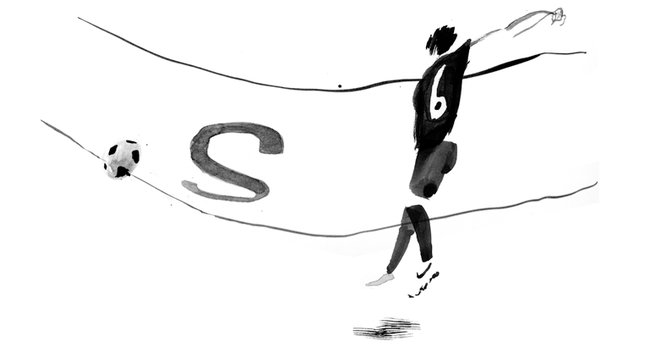
Happy New Year to all!
Back after a month-long break, we are pleased to report that our very own Sean Jacobs made it into the opinion pages of The New York Times yesterday (Sunday, 2 January 2011) as part of the ‘Around the World in 12 Months’ feature. (Some of you may recognize some of the ideas from Sean’s ‘Africa is a Country’ blog). My favorite part is his daughter’s memory of the 2010 World Cup. Click here to read Sean’s entry about the 2010 World Cup in South Africa.
2010 was the year of Africa’s first World Cup, a historic year for South Africa and for the continent. An hour west of Durban’s huge Moses Mabhida Stadium, in the KwaZulu-Natal hills, every weekday afternoon 46 boys train on a modest football ground at the University of KwaZulu-Natal in Pietermaritzburg. These 13-year olds symbolize the immense potential of grassroots football in South Africa.
In an atmosphere of quiet industriousness and positive support, the boys of the Izichwe Youth Football programme go through fitness routines, refine individual skills, and play small-sided games under the watchful eye of several local coaches.
Named after the regiment commanded by Shaka Zulu two centuries ago, Izichwe is a not-for-profit development program providing access to high-level football training and life skills instruction to black youth from the Pietermaritzburg area. Working on a shoestring budget, it helps to overcome enduring barriers to participation in sport for black youth in a democratic South Africa.
It has been an honor and a privilege for me to be part of Izichwe while a Fulbright Scholar at the University of KwaZulu-Natal. I am grateful to Thabo Dladla, Izichwe’s founding director, for warmly welcoming my family into this wonderful sporting community. One of my daughters joined Izichwe–the only girl and the youngest player by three years.
As our involvement with the program intensified, I realized that I had come full circle from my first visit to South Africa in 1993 as a young volunteer sports coach in Khayelitsha, a massive black township on the outskirts of Cape Town. Now I was here with my entire family and I got to rekindle and sharpen my coaching inclinations. I also gave occasional classroom lectures to the youngsters, prepared them for an oral history project, and helped with the year-end function (see video above).
There is something very special about Izichwe. Thabo Dladla, Mhlanga Madondo, “Styles” Mkhize, Patrick “Cutter” Mthembu, Xolani Madlala, Ronnie Chetty and Kristen Konkol provide specialized coaching and caring, constructive leadership. Their positive, non-authoritarian approach aims at unleashing the boys’ potential on and off the football pitch.
Izichwe’s approach is not so much about winning games and tournaments, but about teaching technical, tactical, psychological and physical skills that will serve the teenagers well down the road. This long-term vision of achievement can be tough on the boys. I have seen them lose against teams stacked with over-age players. A few years down the road it will be interesting to compare the achievements of the Izichwe boys with those of the over-age players.
To understand Izichwe is to appreciate how football is closely linked to the physical, intellectual and social growth and development of historically disadvantaged South African youth. Most players come from tough socio-economic circumstances and at Izichwe they learn sport’s values of teamwork, hard work, discipline, and achievement. The daily training routines provide needed structure to these student-athletes’ lives. In many cases, I have seen individuals acquire confidence, strengthen their self-esteem and self-awareness, and even improve their academic performance.
Next year I hope that a girls’ team will be up and running at Izichwe. It is important that the same opportunities offered to boys are also made available to girls. I am confident that a few years from now, many Izichwe veterans—male and female—will be representing their country and competing in top leagues. For those individuals who will opt for a career in something other than football, Izichwe will have empowered them with skills, knowledge and experience to become good citizens and community builders.
As I prepare to leave South Africa in a few days, I want to take this opportunity to thank my fellow coaches and the players at Izichwe. Their warmth, generosity and brotherhood will never be forgotten. This moving experience has reminded me of a German theologian’s response to a question about how to explain happiness to a child: “I wouldn’t explain it,” Dorothee Solle said; “I’d toss him a ball and let him play.”
Autocracy + Petrodollars = FIFADisneyCup
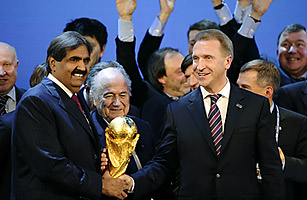 Insightful piece in TIME magazine on FIFA’s decision to stage the 2018 and 2022 World Cup tournaments in Russia and Qatar is well worth reading:
Insightful piece in TIME magazine on FIFA’s decision to stage the 2018 and 2022 World Cup tournaments in Russia and Qatar is well worth reading:
“What the World Cup Choices Tell Us About the World” by Ishaan Tharoor and Tony Karon.
WikiLeaks Targets FIFA
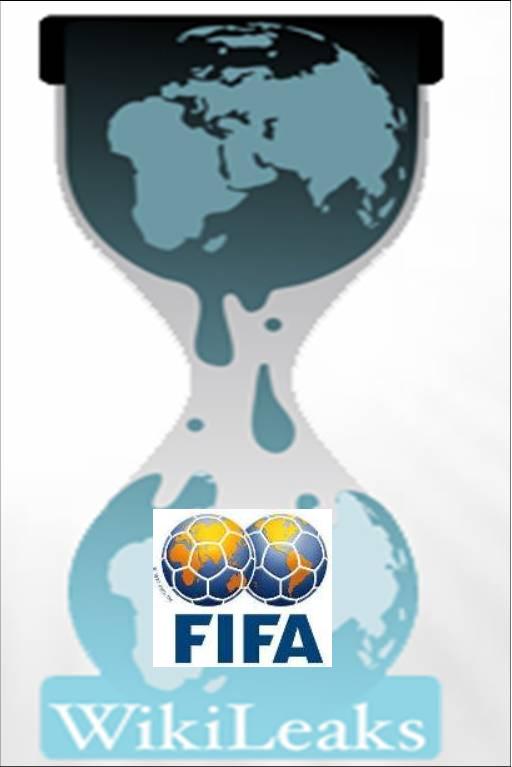
In a few hours WikiLeaks will release thousands of secret FIFA documents detailing World Cup match fixing and widespread corruption within football’s governing body.
Never before have such confidential documents been released into the public domain. The documents will give people around the world an unprecedented insight into FIFA’s activities on the shores of Lake Zurich.
The documents, which date from 1998 to 2010, contain 15,652 confidential communications between FIFA executive committee members in Zurich and corporate sponsors, media networks, and other football officials throughout the world.
But seriously, on Thursday, December 2, FIFA’s ethically challenged executive committee will award the hosting rights for the 2018 and 2022 World Cup. The stench emanating from the bidding “process” has been overpowering to the point that we — the citizens of FootballWorld — would benefit greatly from the assistance of Julian Assange and the people behind WikiLeaks.
As the work of Andrew Jennings showed, revelations of overt facts can damage the image, if not the profits, of FIFA and its corporate allies. Such information would give a vital boost to good governance in the game and instill hope for a healthy football community.